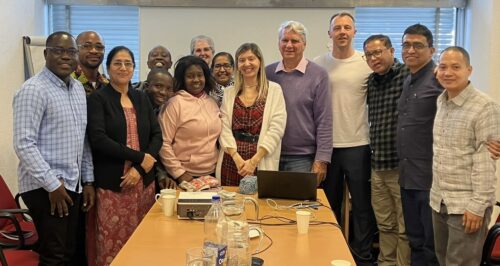
In November, Edmund Rice International (ERI) hosted a two-week training program for twelve attendees in Geneva, a city central to the global human rights movement.
Throughout the training, participants explored the balance between charity and justice, along with a comprehensive study of the UN’s operating procedures and mechanisms. As part of the agenda, they attended two sessions of the Universal Periodic Review (UPR) held by the Human Rights Council, where the human rights records of North Korea and Qatar were reviewed. Additionally, participants observed a Treaty Body session of the Committee Against Torture (CAT) which reviewed Thailand.
The sessions were enriched by distinguished guest presenters: Sara Cavallo (UN) provided insights into UN Special Procedures; Maria D’Onofrio (CCIG) offered an overview of Treaty Bodies; Peter Swiniarski presented the UNHCR’s work with refugees; and Eimear McDermott a representative from the Permanent Mission of Ireland gave a unique perspective on global diplomacy from a diplomats perspective. Presenters not only elaborated on the frameworks themselves but also offered a broader understanding of these structures in the global context.
Members of the ERI team, also led sessions focused on key guiding documents such as Laudato Sí on the Care of the Earth and the Sustainable Development Goals (SDGs), deepening participants’ understanding of the ethical foundations underpinning their work. Beyond the formal sessions, participants toured key historical and humanitarian sites in Geneva, which helped contextualize their learning. They visited the International Labour Organisation (ILO) and the Red Cross Museum, where exhibits on humanitarian resilience and the core values of the Red Cross left a lasting impression.
“I didn’t know that I could contribute to the national conversation. Now, I will dive in to find out what my country is doing and identify organisations I can connect with to support their advocacy on the ground.” — Priscilla Mulenga
“Witnessing the procedure in person showed me that even small actions can lead to great change.” — Melvin Lebby
“I will leave here more motivated to do my part in raising climate change awareness. I’ll encourage my students to participate in programs and become a bigger part of the change myself.” — Nita Fernandes
A significant component of the training was the creation of personalised advocacy plans. Each participant developed and presented a plan detailing how they would apply their newfound knowledge to champion human rights and promote global peace within their communities. The training underscored the urgent need for united, global efforts to address shared challenges. With the world facing ongoing conflicts, the residual impacts of the COVID-19 pandemic, and other crises, collective action for safety, security, and sustainability has never been more vital. Participants left the program inspired, committed to prioritizing these values, and equipped to make a meaningful impact in their communities.
“Human rights are born at small levels in hearts, in a classroom, in a drowning youth holding on to a raft at the Mediterranean and so on and does not depend only on treaties ratified in the UN.” — Priyanthi Samala